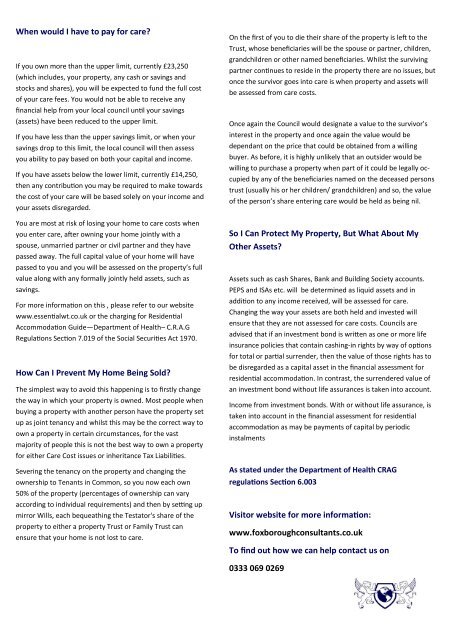Essential Info
You also want an ePaper? Increase the reach of your titles
YUMPU automatically turns print PDFs into web optimized ePapers that Google loves.
When would I have to pay for care?<br />
If you own more than the upper limit, currently £23,250<br />
(which includes, your property, any cash or savings and<br />
stocks and shares), you will be expected to fund the full cost<br />
of your care fees. You would not be able to receive any<br />
financial help from your local council unl your savings<br />
(assets) have been reduced to the upper limit.<br />
If you have less than the upper savings limit, or when your<br />
savings drop to this limit, the local council will then assess<br />
you ability to pay based on both your capital and income.<br />
If you have assets below the lower limit, currently £14,250,<br />
then any contribuon you may be required to make towards<br />
the cost of your care will be based solely on your income and<br />
your assets disregarded.<br />
You are most at risk of losing your home to care costs when<br />
you enter care, aer owning your home jointly with a<br />
spouse, unmarried partner or civil partner and they have<br />
passed away. The full capital value of your home will have<br />
passed to you and you will be assessed on the property’s full<br />
value along with any formally jointly held assets, such as<br />
savings.<br />
For more informaon on this , please refer to our website<br />
www.essenalwt.co.uk or the charging for Residenal<br />
Accommodaon Guide—Department of Health– C.R.A.G<br />
Regulaons Secon 7.019 of the Social Securies Act 1970.<br />
How Can I Prevent My Home Being Sold?<br />
The simplest way to avoid this happening is to firstly change<br />
the way in which your property is owned. Most people when<br />
buying a property with another person have the property set<br />
up as joint tenancy and whilst this may be the correct way to<br />
own a property in certain circumstances, for the vast<br />
majority of people this is not the best way to own a property<br />
for either Care Cost issues or inheritance Tax Liabilies.<br />
Severing the tenancy on the property and changing the<br />
ownership to Tenants in Common, so you now each own<br />
50% of the property (percentages of ownership can vary<br />
according to individual requirements) and then by seng up<br />
mirror Wills, each bequeathing the Testator's share of the<br />
property to either a property Trust or Family Trust can<br />
ensure that your home is not lost to care.<br />
On the first of you to die their share of the property is le to the<br />
Trust, whose beneficiaries will be the spouse or partner, children,<br />
grandchildren or other named beneficiaries. Whilst the surviving<br />
partner connues to reside in the property there are no issues, but<br />
once the survivor goes into care is when property and assets will<br />
be assessed from care costs.<br />
Once again the Council would designate a value to the survivor's<br />
interest in the property and once again the value would be<br />
dependant on the price that could be obtained from a willing<br />
buyer. As before, it is highly unlikely that an outsider would be<br />
willing to purchase a property when part of it could be legally occupied<br />
by any of the beneficiaries named on the deceased persons<br />
trust (usually his or her children/ grandchildren) and so, the value<br />
of the person’s share entering care would be held as being nil.<br />
So I Can Protect My Property, But What About My<br />
Other Assets?<br />
Assets such as cash Shares, Bank and Building Society accounts.<br />
PEPS and ISAs etc. will be determined as liquid assets and in<br />
addion to any income received, will be assessed for care.<br />
Changing the way your assets are both held and invested will<br />
ensure that they are not assessed for care costs. Councils are<br />
advised that if an investment bond is wrien as one or more life<br />
insurance policies that contain cashing-in rights by way of opons<br />
for total or paral surrender, then the value of those rights has to<br />
be disregarded as a capital asset in the financial assessment for<br />
residenal accommodaon. In contrast, the surrendered value of<br />
an investment bond without life assurances is taken into account.<br />
Income from investment bonds. With or without life assurance, is<br />
taken into account in the financial assessment for residenal<br />
accommodaon as may be payments of capital by periodic<br />
instalments<br />
As stated under the Department of Health CRAG<br />
regulaons Secon 6.003<br />
Visitor website for more informaon:<br />
www.foxboroughconsultants.co.uk<br />
To find out how we can help contact us on<br />
0333 069 0269


